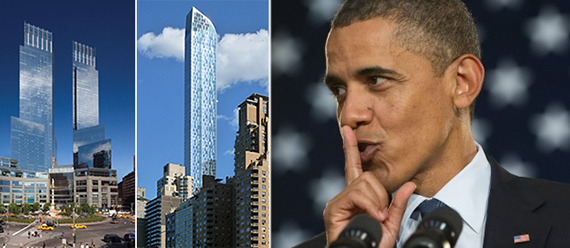Buyers of luxury Manhattan real estate, whose purchases are often shielded by limited liability corporations, will be thrust into the spotlight come March, when new federal disclosure requirements take effect.
But the new order doesn’t necessarily signal the end of anonymous buyers – should they find they have the appetite for financial gymnastics.
“If you’re looking to hide money, you’ll find a way to do it,” said Jonathan Adelsberg of law firm Herrick, Feinstein, who emphasized that many buyers who want to shield their purchase aren’t committing fraud. “The irony is, if you’re engaging in money laundering, and things are really un-kosher, you don’t care about the provision of a contract,” he said.
In an effort to uncover illicit funds being laundered through luxury New York real estate, the U.S. Treasury said Jan. 14 that it would start tracking cash purchases in Manhattan made through shell companies. The order, which takes effect in March, applies to deals $3 million and up and requires title insurance companies to hand over the buyer’s identity to government regulators.
Though it’s hard to Pinpoint Exactly How Many Such Deals Take Place each year, the use of LLCs – both legal and illicit – has proliferated the city’s residential sales market. And many of those buyers may want to preserve their privacy, despite the new order.
Attorney Terrence Oved, a founding partner at Oved & Oved, said there are ways to navigate the requirements and “still be within the letter of the law.”
Adelsberg said ironically, developers typically vet super high-end buyers even before those buyers walk into the condominium’s sales office. “You don’t just walk in. The last thing a [developer] wants to do is find themselves in a dispute with a buyer who doesn’t have the financial wherewithal to close.”
According to attorney Ed Mermelstein, a founding partner of Rheem Bell & Mermelstein LLP, the order doesn’t have much weight, other than to possibly scare off foreign investors. “Everyone is asking the same questions: How do you get around this?” he said, adding that the current order doesn’t carry much weight.
“If you’re looking to prevent money laundering, you don’t implement something for six months. You don’t limit it to markets. And make it permanent,” said Mermelstein. “Don’t allow people to think, ‘In August we can go back to business.’”
Here are seven strategies shy buyers are likely to employ come March, according to a variety of experts The Real Deal interviewed:
1. Use a straw buyer
Theoretically, a buyer can have a “nominee agreement” with their chauffeur, whereby the chauffeur is the named owner of an LLC that is buying a high-priced condo. Once the transaction is complete, the buyer can purchase the LLC – not the actual condo – from the chauffeur. The transaction would not be on the books.
2. Set up a trust, partnership or other non-LLC
While all members of an LLC must be identified, other legal entities only need to disclose owners who hold more than 25 percent ownership. If a shell company with 100 shares is divided equally among 10 people, therefore, they all remain anonymous.
3. Pay with a wire transfer
Regulators are only scrutinizing buyers who pay with cash or a certified bank check. Pay with a wire transfer, and you avoid this order. However, tight banking regulations will require identification as part of “Know Your Customer” regulations.
4. Forgo title insurance
What’s a $1 million lawsuit when you’ve just spent $50 million on a white-glove condominium? Industry execs said it’s rare – but buyers could forgo title insurance altogether.
5. Wait six months
The order takes effect March 1 and currently is due to expire August 27. So a jumpy buyer could simply wait six months to make a purchase. (If said buyer wants to gamble that the program won’t be extended, they could schedule a closing for August 28.)
6. Buy commercial
File this under “obvious,” but the current order is limited to residential purchases in Manhattan above $3 million. Commercial purchases are excluded, so buyers can still purchase investment properties in relative anonymity.
7. Buy in Brooklyn
There may not be as many trophy condos on the market in Kings County, but the Treasury Department’s order excludes this borough, so enterprising buyers could cross the river. And the Feds aren’t scrutinizing deals under $3 million. How do those $2.9 million condos look now?
